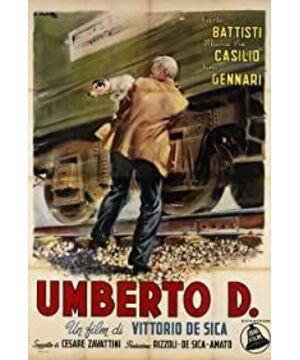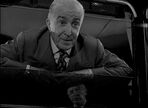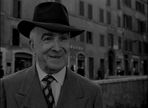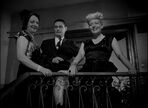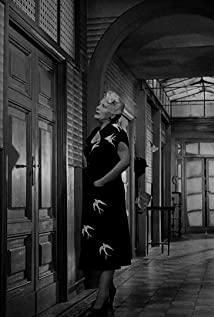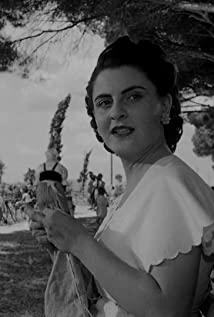"Umberto D" was once praised by many critics as the seal of Desica's neo-realism. Although the box office was very bleak when the film was released at that time, not only did the audience and the film industry not buy it, but also caused dissatisfaction from the government and the government that it vilified the social reality, but it has been elevated to a very important position today after decades. .
We know that many people like to summarize documentary-style shooting and popular scenes as representative features of neo-realism. Therefore, in my opinion, "Umberto D" under this standard is indeed regarded as a good one. A very typical and excellent neo-realist work, it even surpasses "Bike Thief" and "Shoe Shine" in terms of story line and lens use.
The film describes a brief and traumatic life experience of an old man living on a pension. Facing the meager savings and aggressive landlord, the old man’s life is struggling. Only a pet dog and a kind-hearted maid can talk about comfort, but the girl's own situation is also very difficult. Sleeping in the corridor aisle, she not only has to get up early Work late, but also worry about being kicked out by the landlord after finding out she is pregnant. Two parallel lines form the general structure of the film.
On the whole, "Umberto D" is more vivid and real because it weakens the drama of the story. The film no longer sets up all kinds of coincidences like "The Bike Thief" (the thief who can never be caught; the person who knows the thief's address disappears as soon as he leaves the church; the owner appears as soon as Rich steals the bicycle), but The specific moments in the protagonist's life are connected one by one, and there is no necessary connection between the plot and the plot. For example, the old man’s illness does not actually need to go to the hospital, but he still persistently called the medical staff to take him away and wanted to rub the bed in the hospital. Although he was kicked out of the house by the landlord the next day, he still had a story before and after. The causality is not strong, nor does it play a role in promoting the later plot to turn and climax. It is just a listing and display of life fragments. And it is all these fragments of life that string together the old man's inner loneliness and despair. The lack of money can make people embarrassed, but the indifference of human feelings and no one caring is a huge boulder that crushes his heart.
In addition, Desica has made a good interpretation of the concept of "respect for the duration of reality" that Zivatini has always advocated in this film. The little maid gets up in the morning, walks through the corridor, grinds coffee, cleans up the ants, sleepy doing a series of chores in the kitchen, the lens does not cut these meaningless pictures, symbolically concentrates and omits them, but presents them completely It came out as the background shaping of the character. This is an important reason why this film is more in line with the so-called shooting standards of neorealism than "The Bike Stealer" in my opinion. In the selection of actors, Desika once again demonstrated his preference for appointing non-professional actors, and has more skillful guidance skills than other directors of the same period. In this film, the actor who plays Umberto is a professor from Florence. His inherent intellectual temperament provides a lot of help in interpreting a former middle class like Umberto---- Dress decently, behave appropriately, and try to maintain your face even in embarrassing situations. Perhaps thanks to his own actor experience, the non-professional actors in Desica's works always surpass the works of directors such as Rossellini, Visconti, and DeSantis in acting skills. And this kind of casting method has always helped Desica's previous works to neutralize those less neo-realistic elements (such as studio shooting, dramatic plot), and make the film look more cordial and true. In ``Umberto. This method in "D" is even more icing on the cake. In addition, the director and screenwriter are also remarkable in shaping the character of Umberto. The protagonist is obviously more miserable than the protagonist in Desika's previous films. Although Rich didn't have a bicycle, he had at least the support of his family. Although the children in "Shoe Shine Boy" only have friendship, freedom and happiness for a short time, they are more than a little better compared to the old and helpless situation of Umberto, and people can't help but feel compassion and sympathy. However, it is such a fragile and helpless old man who ruthlessly reprimanded the other party when the little maid did not take good care of his pet because of her sadness, and passed his anger on to the same weak individuals around him. He only cares about his own feelings but ignores the pain of others. He hopes that others will give him care but can't understand the experiences of others. It has to be said that this kind of character portrayal breaks through the limitation of non-black and white characters in the arrangement of drama stories from ancient times to the present, making the characters more realistic and three-dimensional, which makes people love and hate. On the other hand, it also paved the way for Desika's theme: at the end of the film, the old man was alone, even the box was thrown aside, holding his beloved pet and walking towards the unknown front. From the beginning to the end, Umberto has been eager for help from others, but the people and things that stay with him have become less and less. He is eager to get rid of loneliness, but is drifting away on the road of loneliness. . This film was born in the 1950s. At this time, Italy has gradually emerged from the shadow of war. The situation of civilians has improved. Many directors are no longer keen on shooting films that are full of suffering and dogmatic. . Therefore, in everyone's eyes, new realism should indeed die. I think this is also an important reason why "UmbertoD" is always dubbed Desica's new realism: people always can't wait to draw a clear line from the old times. And is the director really bored to set such a formal watershed? Obviously not. This will be easily confirmed by subsequent films: Desica has never abandoned his humanistic care and poetic and realistic film style. It is true that economic revolution and social revolution can effectively change the social pattern and the status quo of the poor, but can the loneliness rooted in the human heart really be changed? After the world-renowned Antonioni and others clearly expressed their disapproval of neo-realism, aren't the works they produced based on the dilemmas caused by the exclusivity of human emotions. In my opinion, new realism is not as "new realism" as everyone has said, and later modernism or psychological realism is not as unique as it advertises. Unique. Culture should not be divided and abandoned.
I wrote it for the exam a long time ago, so let’s keep a record.
View more about Umberto D. reviews


